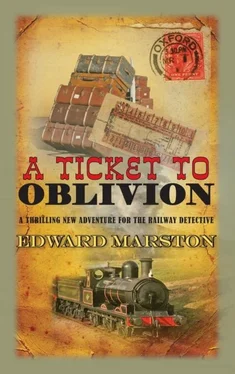Edward Marston - Ticket to Oblivion
Здесь есть возможность читать онлайн «Edward Marston - Ticket to Oblivion» весь текст электронной книги совершенно бесплатно (целиком полную версию без сокращений). В некоторых случаях можно слушать аудио, скачать через торрент в формате fb2 и присутствует краткое содержание. Жанр: Исторический детектив, на английском языке. Описание произведения, (предисловие) а так же отзывы посетителей доступны на портале библиотеки ЛибКат.
- Название:Ticket to Oblivion
- Автор:
- Жанр:
- Год:неизвестен
- ISBN:нет данных
- Рейтинг книги:5 / 5. Голосов: 1
-
Избранное:Добавить в избранное
- Отзывы:
-
Ваша оценка:
- 100
- 1
- 2
- 3
- 4
- 5
Ticket to Oblivion: краткое содержание, описание и аннотация
Предлагаем к чтению аннотацию, описание, краткое содержание или предисловие (зависит от того, что написал сам автор книги «Ticket to Oblivion»). Если вы не нашли необходимую информацию о книге — напишите в комментариях, мы постараемся отыскать её.
Ticket to Oblivion — читать онлайн бесплатно полную книгу (весь текст) целиком
Ниже представлен текст книги, разбитый по страницам. Система сохранения места последней прочитанной страницы, позволяет с удобством читать онлайн бесплатно книгу «Ticket to Oblivion», без необходимости каждый раз заново искать на чём Вы остановились. Поставьте закладку, и сможете в любой момент перейти на страницу, на которой закончили чтение.
Интервал:
Закладка:
‘You dispatched only two detectives?’ he asked, aghast.
‘They are highly experienced, sir.’
‘Scores of men will be needed to comb the area between Shrub Hill and Oxford. How can two individuals cover an area that vast?’
‘Any search of the line would be undertaken by railway policemen. They do not answer to me. Since he is on the board of the railway company, I’ve no doubt that Sir Marcus will already have cracked the whip and instigated a methodical search. What my detectives will be doing,’ said Tallis, ‘is to gather evidence painstakingly before reaching a conclusion.’
‘What more evidence is there?’ said Tunnadine, slapping a knee. ‘Two people board a train then vanish before it reaches its destination.’
‘It’s not as simple as that, sir.’
‘They must somehow have fallen out of the train.’
‘That’s only supposition.’
‘Can you suggest an alternative explanation?’
‘I can think of a few,’ Tallis told him, ‘but then I’m rather more acquainted than you with seemingly impenetrable mysteries. Your concern is understandable and may — to a limited extent — excuse the way that you barged unannounced into my office. I would advise you to keep calm and have confidence in Inspector Colbeck.’
‘Has he ever handled a case like this before?’
‘No, I don’t believe that he has, sir.’
‘Then he is just groping in the dark,’ said Tunnadine, hotly.
Tallis smiled. ‘I can see that you’ve never met the inspector.’
‘I insist on doing so at the earliest possible time.’
‘That can be arranged.’
‘What are his movements?’
‘When he’s finished at Burnhope Manor, he intends to visit Oxford to meet the family with whom the two ladies were intending to stay.’
‘What use is that?’ asked Tunnadine. ‘Imogen never even reached them. They can tell him absolutely nothing of value.’
‘You underestimate Inspector Colbeck,’ said Tallis, speaking about him with a fleeting affection. ‘He is a master of the unorthodox. His methods may at times seem odd — not to say perverse — but I can assure you that they invariably bear fruit.’
When the detectives found him, Vernon Tolley was polishing the landau in a desultory way. His mind was clearly on other things and it didn’t take them long to find out what they were. Because he’d driven Imogen and her maid to the station, he felt obscurely to blame for the tragedy and knew that Sir Marcus took the same view. If the missing passengers were not found alive and well, Tolley expected to be dismissed summarily. What really concerned him, however, was the fate of Rhoda Wills. When Colbeck asked him to describe the appearance and character of the two women, he spoke with undisguised fondness of Imogen’s maid. He was too loyal to be drawn into any criticism of Sir Marcus and his wife, though he did admit that the latter kept their daughter under constant surveillance.
‘Let’s go back to the start,’ suggested Colbeck. ‘When the two ladies left the house, were both parents there to see them off?’
‘Oh, no,’ said Tolley, wiping the back of a hand across his mouth. ‘Lady Burnhope was too ill to come out so she waved them off from an upstairs window.’
‘Which one?’ asked Leeming. ‘There must be twenty or more to choose from.’
‘People in the village call this the Glass House.’
‘What about Sir Marcus?’ wondered Colbeck. ‘Did he wave them off?’
‘He was busy somewhere inside the house.’
‘Was that typical of him? Does Sir Marcus always show such little interest in his daughter’s movements?’
‘He’s a very important man, Inspector.’
‘It would only have taken a matter of minutes,’ observed Leeming.
‘This was the first time his daughter had travelled to Oxford without her mother,’ said Colbeck. ‘That made the visit rather special.’
‘It did, Inspector,’ agreed Tolley. ‘It was unusual not to have Lady Burnhope holding forth in the carriage. I could see that Rhoda — Miss Wills, that is — was very pleased that they were alone.’
‘What else was unusual, Mr Tolley?’
The coachman shook his head. ‘Nothing,’ he said.
‘There must have been something ,’ pressed Colbeck. ‘Think hard.’
‘The tiniest detail may be of interest to us,’ said Leeming.
‘Tell us about any variation from the norm.’
Tolley frowned. ‘Well, there was the money,’ he recalled. ‘When Sir Marcus and Lady Burnhope travel by train, they never give money to me or to the porter who stows their luggage aboard. Their daughter was different. Both of us got a sovereign for our pains. Imagine that — a whole sovereign apiece’ His face clouded. ‘I’d sooner lose the money and have the two of them safely back here again.’
‘I’m sure that you would,’ said Colbeck, touched by his distress. ‘Is there anything else you can tell us, Mr Tolley? What made this journey a little different?’
Tolley removed his hat to scratch his head. He had been over the events of the morning countless times in his head and thought that he had a complete picture of what had happened. It took a long time before one more detail popped out.
‘There was the valise,’ he remembered.
‘What about it?’ asked Colbeck.
‘Well, it’s rather large and heavy. Whenever they’ve travelled with it before, it was always loaded onto the roof of the carriage with the other luggage. For some reason, it travelled inside with them this time.’ His eyes widened hopefully. ‘Is that the kind of thing you mean, Inspector?’
Colbeck was grinning. ‘It is, indeed,’ he said.
‘Will it help you to find them?’
‘Let me put it this way, Mr Tolley. You may take heart. I have a strange feeling that your job will be safe, after all.’
CHAPTER FOUR
Bent on pursuing his political career, Sir Marcus Burnhope had left the upbringing of their daughter almost wholly to his wife. He put in a token appearance at crucial moments in Imogen’s young life but otherwise saw very little of her. To atone for his frequent absences, he gave her a generous allowance and plied her with gifts. Paulina, too, had been neglected in favour of parliamentary affairs and he was very conscious of that as he climbed the staircase to her bedchamber. It had taken Imogen’s dire predicament to remind him of his many shortcomings as a husband and father. For once in his life, the future Secretary of State for India was compelled to put the family first. It was a novel experience and deeply unsettling as a consequence.
‘How did you find her?’ he asked the doctor.
‘Lady Burnhope is still very agitated,’ replied the other.
‘I tried to conceal the news from her but she insisted on hearing it.’
‘She talked of nothing else.’
‘Is there some way to calm her down?’
‘I’ve given her a sedative, Sir Marcus. She’ll soon be asleep.’
‘Thank you. Call again tomorrow. You may well be needed’
They’d met on the landing. Doctor Ferris was a white-haired old man with sharp instincts acquired over many years of sitting at the bedsides of the sick and dying. Though softly spoken and deferential, he made it clear that his patient was to be given the medication prescribed.
‘I’ve left my instructions on the bedside table,’ he said.
‘They’ll be obeyed to the letter.’
‘In that case, Sir Marcus, I’ll take my leave.’ The doctor looked over his shoulder. ‘If you wish to speak to Lady Burnhope, I suggest that you do so very soon. She’s already drowsy.’
While the doctor padded off down the staircase, Sir Marcus knocked gently on the door of his wife’s bedchamber then let himself in. Paulina was propped up on some pillows, mind in turmoil. When she saw her husband enter, she reached out a desperate hand. He moved across to hold it between both palms.
Читать дальшеИнтервал:
Закладка:
Похожие книги на «Ticket to Oblivion»
Представляем Вашему вниманию похожие книги на «Ticket to Oblivion» списком для выбора. Мы отобрали схожую по названию и смыслу литературу в надежде предоставить читателям больше вариантов отыскать новые, интересные, ещё непрочитанные произведения.
Обсуждение, отзывы о книге «Ticket to Oblivion» и просто собственные мнения читателей. Оставьте ваши комментарии, напишите, что Вы думаете о произведении, его смысле или главных героях. Укажите что конкретно понравилось, а что нет, и почему Вы так считаете.












